Germany's Ursula von der Leyen nominated to lead EU Commission
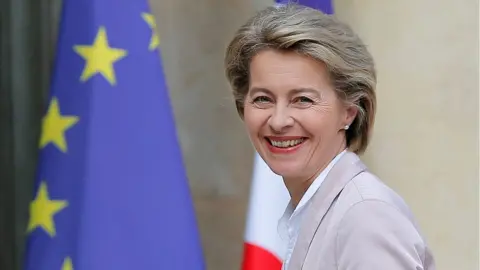 Reuters
ReutersEU leaders have put forward their nominations for the bloc's top jobs, with a woman for the first time proposed as European Commission chief.
The surprise choice of German Defence Minister Ursula von der Leyen to replace Jean-Claude Juncker came after the main front-runners were rejected.
IMF chief Christine Lagarde has been nominated as the first woman to head the European Central Bank (ECB).
The announcement follows days of difficult negotiations.
In all, EU leaders were tasked with nominating five people for the top jobs.
Belgian liberal Prime Minister Charles Michel is nominated to replace European Council President Donald Tusk while Spain's Josep Borrell is proposed as foreign policy chief.
The fifth key role - president of the European Parliament - is to be chosen on Wednesday. Possible candidates include German centre-right MEP Manfred Weber and Bulgarian socialist Sergei Stanishev.
Most of the roles must be ratified by the European Parliament.
Is everyone happy with the choices?
"We have agreed the whole package before the first session of the European Parliament," said Mr Tusk.
He said Germany had abstained on Mrs von der Leyen's nomination over coalition issues but pointed out that Chancellor Angela Merkel herself had backed her.
French President Emmanuel Macron said the nominations were "the fruit of a deep Franco-German entente".
"Von der Leyen is a very good candidate and a very good choice to head the European Commission," he told reporters, adding that Ms Lagarde's "capacities and competences... totally qualified her" for the ECB.
Irish Prime Minister Leo Varadkar said the nomination of two women for key jobs sent a powerful message that the EU was leading the way towards gender equality.
However, there were concerns that the European Parliament's own contest for the main job - the "Spitzenkandidaten" (lead candidate) process - had been cast aside. Neither the winner of that process, Manfred Weber of Germany, nor other frontrunners were selected by EU leaders.
"You have to compromise in politics," Mr Varadkar insisted, adding that the centre-right Mr Weber would most likely be given the shared presidency of the European Parliament along with a Socialist figure.
There was also surprise that four of the main jobs had gone to Western Europeans, with no nominations from Eastern Europe.
However, the eastern states are thought to have been strongly behind Mrs von der Leyen's nomination, having rejected a compromise involving Dutch Labour leader Frans Timmermans the night before.

Days of indecision reveal EU power shift

Ursula von der Leyen - if confirmed as new European Commission president - will not bring winds of change to Brussels. She's loyal to the German Chancellor Angela Merkel, a true Christian Democrat and a conservative Europhile.
As for Brexit, remember, the European Commission negotiated on behalf of EU member states. Those negotiations ended when the UK government signed off on the Brexit Withdrawal Agreement back in November.
The only ones now with the legal power to change or add to the text are EU national leaders, not the commission. And what these days of indecision among national leaders over these top EU jobs have shown us is that while France and Germany are still powerful, they are not all-powerful in EU circles any more.
Chancellor Merkel and President Macron were unable to impose on others the EU job allocation plan agreed between them at the G20. Something for the new UK prime minister to consider, perhaps, ahead of planning trips to Berlin and Paris to request a renegotiation of the Brexit deal.

The nominees in full
Ursula von der Leyen - European Commission president
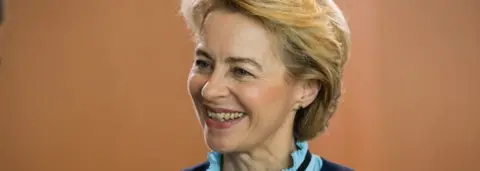 EPA
EPAWhat's the job? The EU commission president heads the executive branch, sets the policy agenda and controls a cabinet of commissioners.
Who is she? Born in Brussels, Mrs von der Leyen, 60, and her family moved to Germany when she was 13. She studied economics at London's LSE and medicine in Hanover before going into politics.
She has been a member of Mrs Merkel's conservative Christian Democrats (CDU) since 2005.
If Mrs von der Leyen is confirmed in the role it would be the first time in more than 60 years that a German has been given the post.
Christine Lagarde - head of the European Central Bank
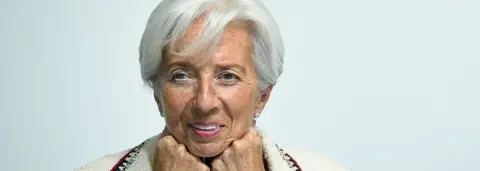 AFP
AFPWhat's the job? Running the ECB, which is responsible for the euro and the monetary policy of the eurozone. The role is currently filled by Mario Draghi, who was widely credited with saving the euro during the eurozone debt crisis.
Who is she? Ms Lagarde, 63, who is French, was the first woman to head the International Monetary Fund (IMF) when she took the job in 2011.
She studied in the US before graduating from law school in Paris and obtaining a Masters degree from the Political Science Institute in Aix en Provence
She was appointed France's trade minister in 2005 and finance minister in 2007.
Charles Michel - European Council president
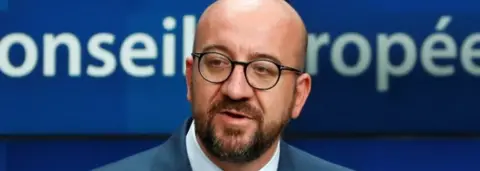 Reuters
ReutersWhat's the job? Chairs the body made up of the leaders of EU member states which defines the EU's political direction.
Who is he? In 2014 Mr Michel at the age of 38 became Belgium's youngest prime minister since 1841.
He has been a lawyer at the Brussels Bar since 1998 and a member of the Belgian parliament since 1999.
Mr Michel's father, Louis Michel, has also been a prominent politician and an MEP.
Josep Borrell - EU foreign policy chief
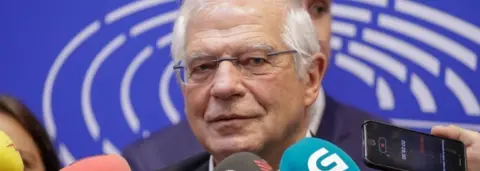 EPA
EPAWhat's the job? Co-ordinating and representing foreign and security policy for the EU. The brief is currently held by Italy's Federica Mogherini.
Who is he? The 72-year-old Spanish foreign minister is set to make a return to the top tier of EU politics after serving as European Parliament president from 2004 to 2007.
He began his career as a member of the Spanish Socialist Party in 1975 and has a reputation for plain speaking.
